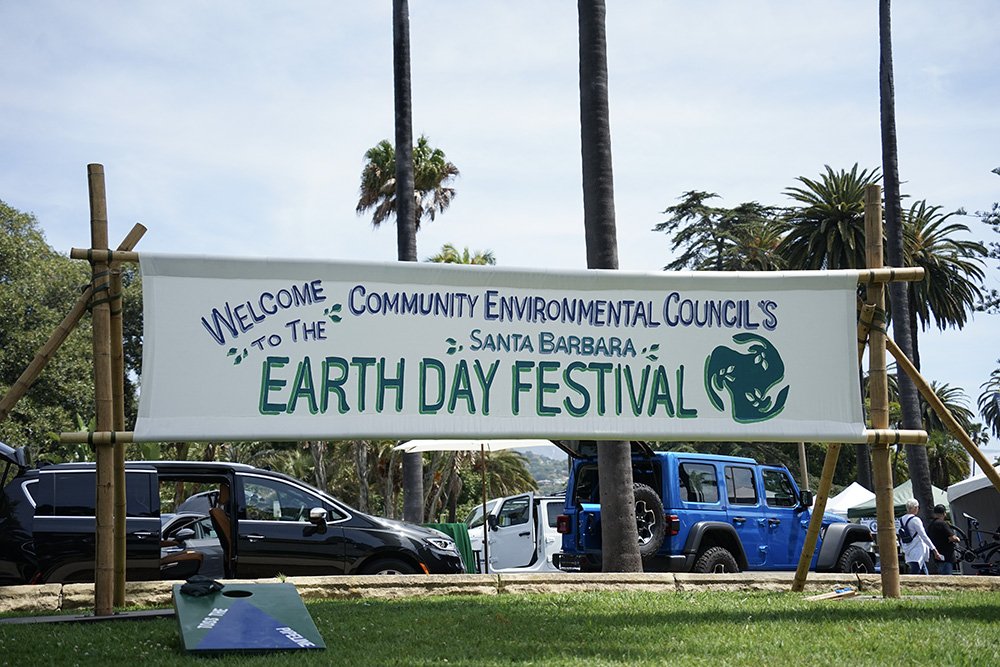
Blog
A space for learning.
- action alert
- alternative transportation
- CARB
- clean energy
- clean mobility
- climate stewards
- community resilience hubs
- donor stories
- earth day
- elderberry project
- electric vehicles
- electrification
- environmental hero
- environmental justice
- extreme heat
- food waste
- healthy soils
- home electrification
- language access
- language justice
- managed grazing
- newsletter
- nuestro tiempo
- plastic reduction
- shop secondhand
- sigrid wright
- webinar toolkit
- wildfire resilience
- Youth

Building Resilience in the Face of Extreme Heat: A Call to Action
It’s August, and extreme heat season is upon us on California’s Central Coast. We’ve already had multiple high temperature alerts throughout the tri-counties (plus the flood watch issued earlier this week due to the unprecedented tropical storms unleashed in our region by Hurricane Hilary), and long-term heat trends keep rising.

Extreme Heat: A Call to Action
With extreme heat posing such serious threats to human health and the environment, the time to take action is now to prepare for extreme heat and build resilient communities.

Free Extreme Heat Forum on Tuesday, August 15
If you (or someone you know) are 65 and older, live on California’s Central Coast, and are concerned about rising temperatures in our community, we invite you to join us for our inaugural Extreme Heat Forum presented by the Gray Panthers Santa Barbara Network, Society of Fearless Grandmothers Santa Barbara, and the Community Environmental Council on Tuesday, August 15, 2023, from 5:00-7:00 p.m.

Beat the Heat: Lessons Learned from the Fastest Warming County in the Nation And How You Can Ensure Neighbors Are Safe When Temperatures Rise
Did you know Ventura County is warming faster than almost anywhere else in the US?
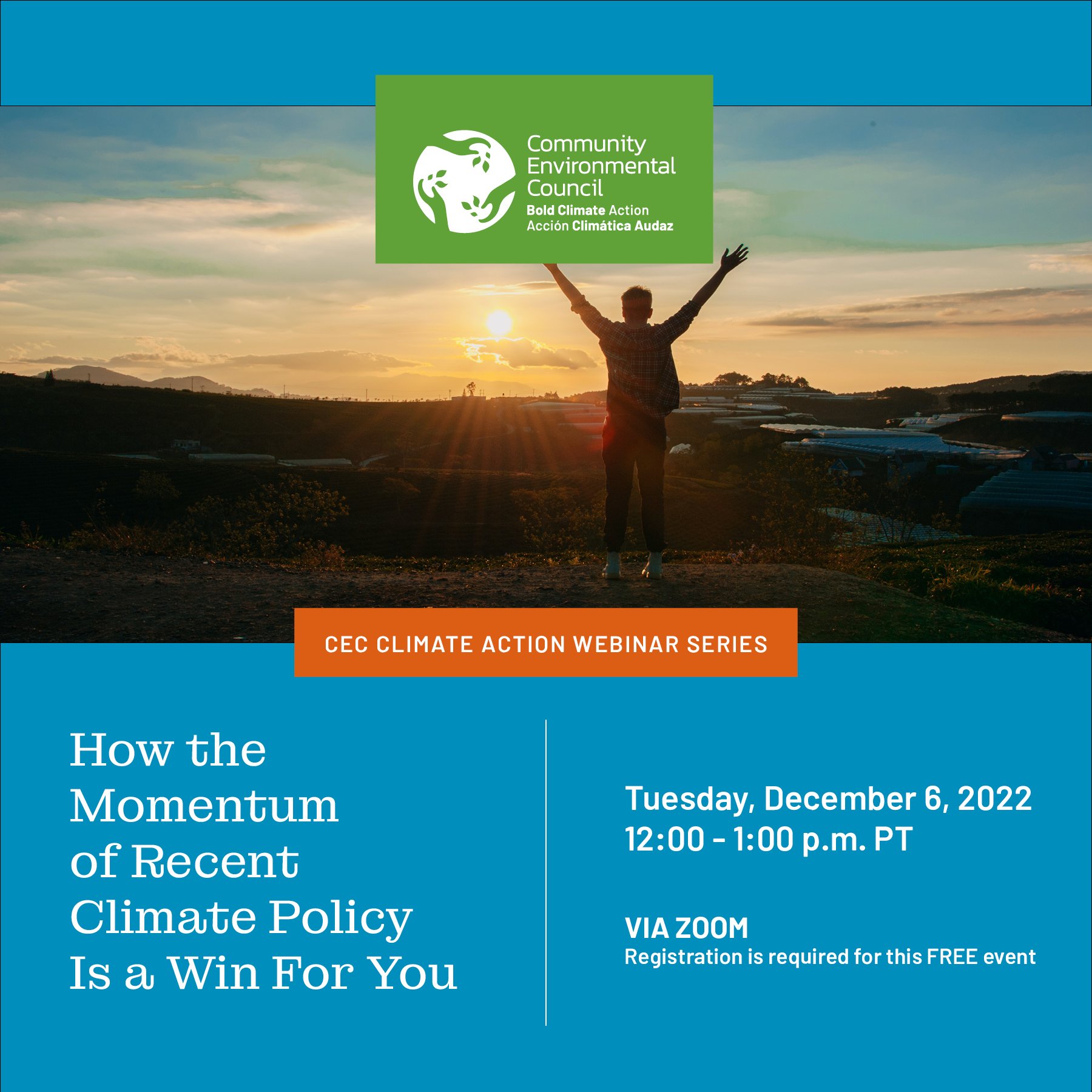
How the Momentum of Recent Climate Policy Is a Win For You
Want to know why the recent wave of federal and California climate legislation is so exciting – and how it can help your pocketbook? Join us to learn how these tremendous policy developments are catalyzing climate momentum like never before.

A New Initiative Will Create Neighborhood Resilience Hubs to Serve Vulnerable Populations
Imagine your community is impacted by the next wildfire that starts in our region. Maybe your home is in close proximity to the flames, or the smoke and ash from the fire drifts to your doorstep. How will you respond? Will you have the supplies you need? Will you know when or where to evacuate to? If you lose power, how will you prepare food, stay cool, or run air purifiers? What if you have a neighbor who needs help? By sharing information and resources, residents can be empowered to support each other and build community resilience in the face of wildfires, earthquakes, extreme heat, and other natural disasters.
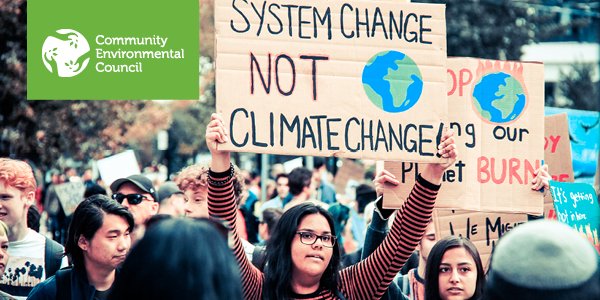
Five Climate Actions You Can Take Now

All Hooves On Deck
CEC co-hosts a community supported grazing summit to boost wildfire resilience.
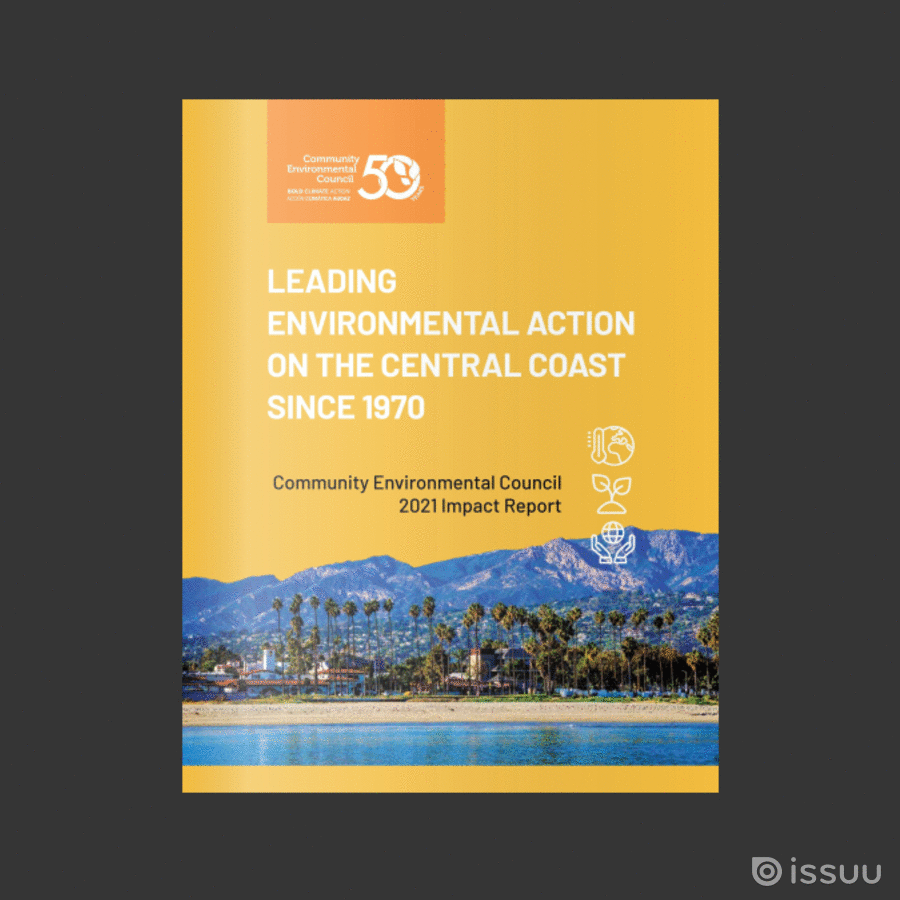
7 Reasons to Have Hope for the Climate


As the United Nations Sounds a Warning Bell: CEC Releases First-Ever Action Plan for Climate Resilience on California’s Central Coast
This unprecedented plan addresses the most pressing climate threats to our region – offering solutions that are needed now and can be immediately activated to build resilience across our community.
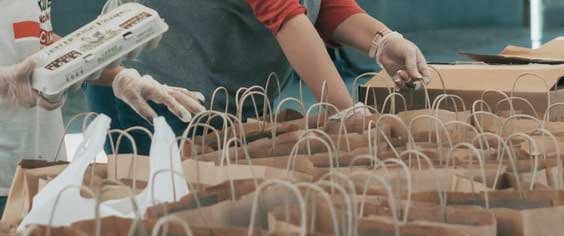
Feeding Families, Nurturing Community

The Worms That Make up the Gaviota SOIL Program

Revertir, Reparar, Proteger: Plan de acción climática audaz del CEC
La Casa Blanca ha declarado oficialmente que estamos en una emergencia climática. Es hora de apoyarse en soluciones locales como nunca lo hemos hecho, y eso significa una acción climática implacable, enfocada, inclusiva y valiente en la Costa Central.
CEC (Consejo Comunitario del Medio Ambiente por sus siglas en inglés) delineado un plan ambicioso sobre cómo nuestra comunidad puede enfrentar este momento urgente y trabajar juntos para detener la crisis climática, de manera rápida y equitativa, a través de tres esfuerzos principales:
Cero carbono: Trabajando para que no haya nuevas emisiones
Carbono negativo: Aprovechar el poder de la naturaleza para eliminar el exceso de carbono de la atmósfera
Protección del clima: Abordar los impactos del cambio climático que ya están en marcha

Reverse. Repair. Protect. CEC’s Bold Climate Action Plan
The White House has officially declared we are in a climate emergency. It’s time to lean into local solutions like never before – and that means unrelenting, focused, inclusive, and courageous climate action on the Central Coast.
CEC has outlined an ambitious plan for how our community can meet this urgent moment and go all in together on halting the climate crisis – rapidly and equitably – through three major efforts:
Reverse: Push for ambitious, equitable zero emissions and zero waste goals for the energy, transportation, food, and agriculture sectors
Repair: Tap into the power of nature to draw down excess carbon from the atmosphere and repair the disrupted carbon cycle
Protect: Safeguard the health of our general public and vulnerable populations from the impacts of climate change already underway

What We’re Listening To: Food For Thought


Feeding Our Soils and Feeding Ourselves
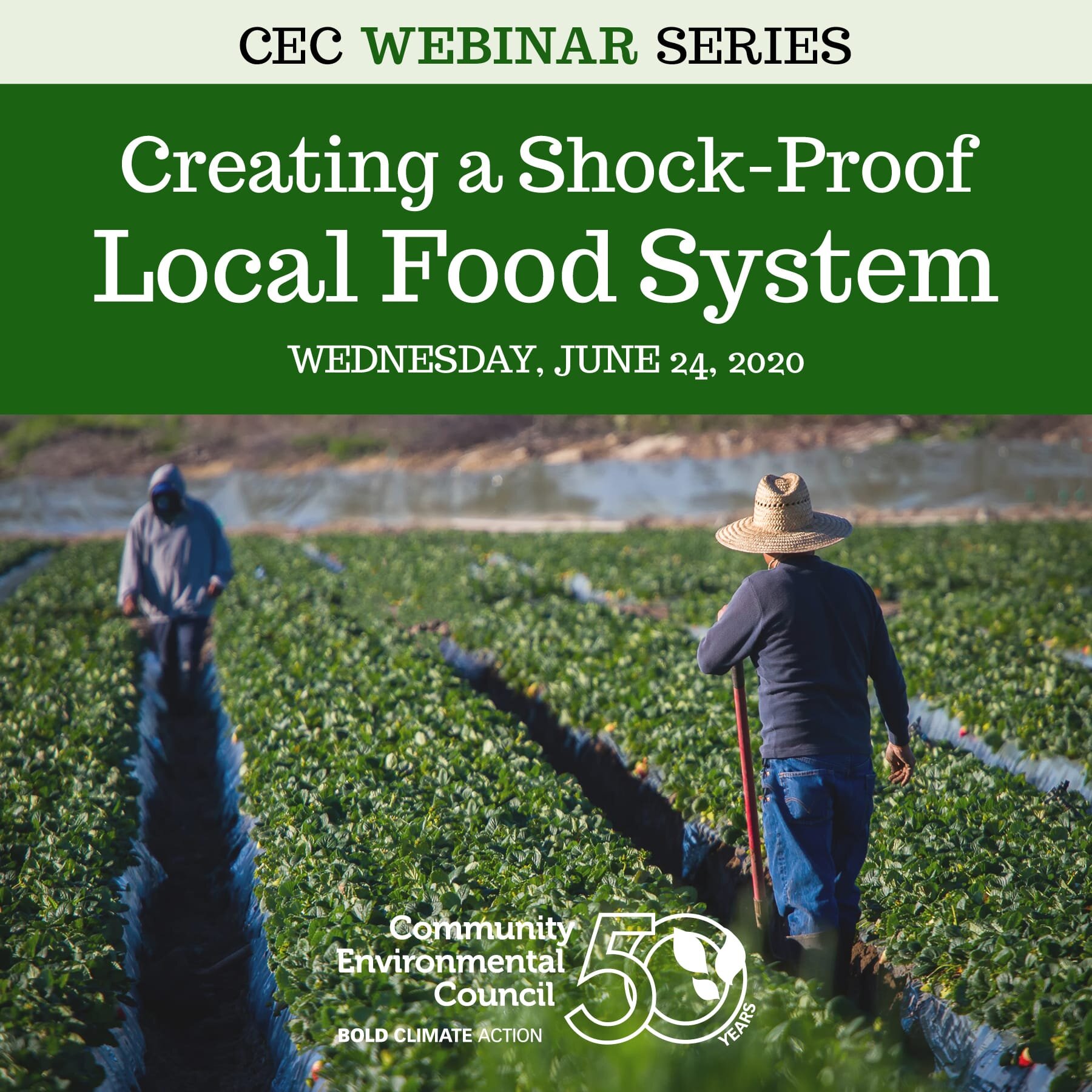
Creating a Shock-Proof Local Food System
Over the last few months, we’ve witnessed in real time how shocks to the globalized food system impact one of the most basic human rights: the right to healthy, accessible food. Entangled in the global COVID-19 pandemic and climate-related disasters are layers of wealth, race, privilege and language that affect the ability of Central Coast communities to survive and thrive.
In this webinar, we explored how CEC’s Food Rescue program and other local efforts are working to support those most vulnerable to hunger – particularly students, unsheltered populations, farm workers and seniors. We also discussed the work of the Santa Barbara County Food Action Network to equitably stitch together the torn fabrics of our food system – from local farmers and fishermen, to local restaurants and distributors.

TEDxSantaBarbara: The Pandemic Did Not Solve the Climate Crisis
CEC’s CEO Sigrid Wright recently joined TEDxSantaBarbara‘s Mark Sylvester to discuss the Five Important Trends for the Climate as part of TEDxSantaBarbara’s Making Waves: Conversations with Influencers and Disrupters.

Inside Julia’s Kitchen: Meet Julia Blanton, SBC Food Rescue Program Coordinator
Recently on Inside Julia’s Kitchen, a podcast of The Julia Child Foundation for Gastronomy and the Culinary Arts, host Todd Schulkin talked with CEC’s SBC Food Rescue Coordinator Julia Blanton about food rescue and how it has been used to address food insecurity and put restaurants back to work during the Covid-19 pandemic. Plus, Julia shares her “Julia Moment”.


For The Community Environmental Council, The Show Must Go On

Resilience From the Ground Up

Unraveling the Kinks in the Local Food Chain to Build and Sustain a Resilient Food System
Like a heat map, the COVID-19 pandemic has drawn attention to areas of strain, places where we need to pay greater attention. One of the most noticeable of these is the food system.

Food Resilience During the Pandemic: Habits to Learn and Systems to Strengthen
Here’s what we know: a local, diversified and equitable food system can be one of our best defenses in moments of community crisis. CEC's Food and Climate Program Manager shares how food system resilience is at the foundation of community resilience, which is the foundation of climate resilience.

The Light Blue Line: 13 Years Later
In 2007 a proposal to stripe a blue line throughout downtown Santa Barbara would have shown the potential sea level rise in our fair city as a result of climate change. I was shocked to see how much of the community would be impacted — sandy beaches gone, coastal habitats lost, neighborhoods wiped out, and transportation corridors flooded.

Battling Climate Change with Healthy Soils
CEC is excited to announce that, in partnership with the Ventura County Resource Conservation District, the Limoneira Company, Agromin, and the UC Cooperative Extension, we have been awarded a grant from the California Department of Food and Agriculture to study and demonstrate the benefits of soil health and “carbon farming” practices in Ventura County.

Combatting Hunger and Pollution with CalRecycle Grant
Food waste makes up nearly 20 percent of California’s disposal stream. At CEC, we are proud to share we were one of 36 grant recipients chosen by the California Department of Resources Recycling and Recovery (CalRecycle) to work toward projects that prevent waste, reduce pollution, and combat climate change by getting good food to Californians who need it.


